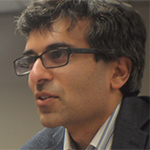Background: Dr. Singh has dedicated the bulk of his research career to gout, which he is quick to note is the most common inflammatory arthritis in adults, more common than RA. But he wants people to know more research is always needed.
Dr. Singh received his medical training at the University College of Medical Sciences in Delhi, India, and later completed a three-year research fellowship in rheumatology at Barnes Jewish Hospital and Washington University at St. Louis. His research foci have included evidence-based medicine, patient outcomes in gout and total joint replacement. He led the team that developed the 2012 and 2015 ACR Rheumatoid Arthritis Treatment Guidelines and led an international team to publish the first Cochrane overview and the first two Cochrane network meta-analyses in the Cochrane library comparing the efficacy and harms of biologics in RA and other conditions that provided indirect comparisons of biologics in the absence of head-to-head trial data, examples of evidence-based medicine and comparative effectiveness in RA.
Q: You’ve seen the practice of medicine in India, upstate New York and Alabama. How are those worlds different?
A: In most ways the same, in some ways different. The pain, the suffering in someone who is untreated, not yet diagnosed, is the same, worldwide. The smiles you can put on faces when you help patients is also the same. The gratitude, the hugs, the thank you notes still bring out the same emotions and mist in the eye. What’s different in India vs. New York and Alabama? In India, the patient [to] physician ratio is very high, resources are much more limited, the government provides free or subsidized medical care to a large population in a dual public-private system like in the U.K., and infectious diseases still constitute a major burden among rheumatic conditions and other medical conditions.
Q: What do you see as the future of evidence-based medicine?
A: I think personalized medicine is the next frontier. Physicians and patients are increasingly adopting evidence-based medicine into practice to help and guide them to choose the most effective option individualized for the patient given his or her comorbidities and potential risk factors for side effects. In the future, we will likely develop tools to take the existing knowledge on a population or patient level from trials and other studies, and plug in the information in real time to help us select the most beneficial therapy, with minimal risk, individualized for each patient.
Henry Kunkel Young Investigator Award
 Soumya Raychaudhuri, MD, PhD
Soumya Raychaudhuri, MD, PhD
Associate Professor of Medicine, Harvard Medical School, Boston; Associate Physician, Brigham and Women’s Hospital, Boston



